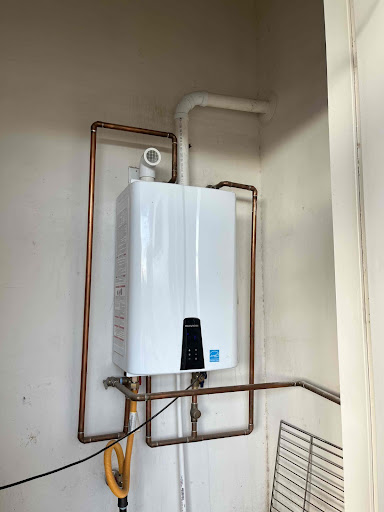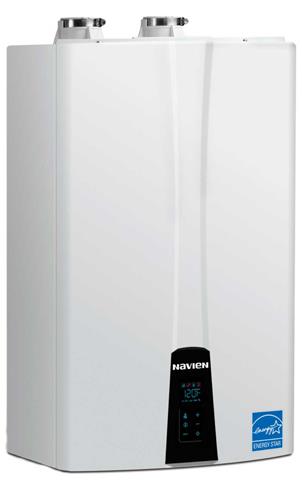Best Factors Why Tankless Water Heaters Become Beneficial
Best Factors Why Tankless Water Heaters Become Beneficial
Blog Article
This post down below pertaining to Unveiling the Hot Trend: The Benefits of Tankless Water is pretty much informative. Don't miss it.

In a globe where ease and performance preponderate, it's not a surprise that homeowners are constantly in search of smarter ways to manage their home's power usage and comfort. One advancement that has continuously gained appeal is the tankless hot water heater. But what exactly makes these systems stick out from the standard tank-based models the majority of us grew up with? Allow's dive in and discover the benefits of tankless water heaters, helping you make a decision if it's time to make the button in your house.
Intro
Photo this: you step into the shower after a lengthy day, expecting a comforting cascade of hot water, only to be greeted by icy droplets since the last individual utilized everything up. Sound familiar? Traditional hot water heater store a fixed amount of hot water, suggesting you're at the mercy of that tank's supply. Tankless systems, on the other hand, heat water on demand. No more running out mid-shower, no more fumbling with timetables just to ensure warm water is offered.
Recognizing Tankless Hot Water Heater
What Are Tankless Hot Water Heater?
Tankless water heaters, in some cases known as on-demand or immediate hot water heater, give hot water only as it's required. Instead of saving gallons of pre-heated water, these systems kick into activity the moment you switch on the tap. Water travels through a heat exchanger, heating up in real-time, suggesting you get a nonstop flow of hot water without the demand for a large tank sitting lazily by.
Just how Do They Vary from Typical Equipments?
Typical heaters hold a storage tank of warm water, utilizing energy to maintain that storage tank at a consistent temperature. Tankless units get rid of the standing supply, reducing wasted power and the cumbersome footprint of a large cyndrical tube. Basically, you're updating from a "stockpile" attitude to a "made-to-order" method.
Common Types of Tankless Devices
Tankless hot water heater typically are available in two selections: gas and electrical. Gas models tend to deliver higher flow rates, ideal for larger households, while electric models commonly serve smaller sized homes and are usually simpler to set up. In addition, some systems are created for point-of-use (serving one component) while others can handle the whole home's warm water needs.
Trick Benefits of Tankless Water Heaters
Power Performance and Expense Savings
No more heating a giant storage tank's well worth of water and maintaining it warm all the time. Tankless heating units reduce standby energy losses, which can lower utility expenses. While the first price could be higher, the lasting cost savings commonly warrant the investment.
3. Space-Saving Design
If your home is short on storage, eliminating the bulky container maximizes beneficial space. Tankless devices are compact and can usually be installed on wall surfaces, stashed in corners, or set up in limited utility closets without grabbing all of the whole space.
4. Longer Lifespan
A well-maintained tankless water heater can outlast its tank-based cousin. Typical storage tanks might last 10-15 years, while tankless versions can maintain chugging along for twenty years or more, making them a strong investment over time.
1. Endless Hot Water Supply
Ever before had to set up showers so everyone gets their fair share of hot water? With tankless, that becomes a distant memory. As long as the heating unit's flow capability isn't exceeded, you can take back-to-back showers without developing into a popsicle.
5. Improved Water High Quality
Saving water in a storage tank can in some cases cause sediment accumulation or a slightly "off" taste. With tankless systems, fresh water is heated right away, minimizing the opportunities of sediment accumulation and possibly supplying cleaner-tasting water.
Considerations Prior To Changing
Though the advantages are compelling, it's smart to take into consideration a couple of elements prior to completely devoting.
Assessing Your Home's Water Use Patterns
If your home concurrently makes use of numerous fixtures with high hot water demand, make certain the unit's flow price satisfies your demands. Understanding your usage patterns assists you select the ideal size and sort of tankless heating unit.
Maintenance and Treatment Tips
Tankless systems are fairly low upkeep, however they aren't set-it-and-forget-it devices.
Normal Cleaning and Descaling
Difficult water minerals can build up in the heat exchanger, affecting efficiency. Regular descaling (frequently suggested yearly) keeps the device running at peak performance.
Yearly Specialist Assessments
A yearly checkup from an expert makes certain minor issues are caught early. They'll assess the unit's efficiency, search for leakages, and assist keep optimum effectiveness.
First Investment Expenses
Tankless heating units generally include a greater ahead of time price tag. Between the device itself and possible setup modifications, the preliminary price might provide you sticker label shock. However remember to watch it as a long-term financial investment.
Installation Demands
Relying on your home's framework, you may require additional electrical capability or gas line upgrades. Guarantee you recognize the installation demands and speak with an expert to stay clear of shocks.
Making Certain Correct Air Flow
For gas designs, appropriate ventilation is important to safely expel exhaust gases. Make sure airing vent systems are tidy and properly installed to avoid any type of possible safety risks.
Contrasting Different Brands and Versions
Not all tankless hot water heater are produced equal.
Researching Trustworthy Suppliers
Seek respectable brand names with a background of creating top quality systems. A trusted supplier commonly provides far better client assistance and longer warranties.
Setup: DIY or Specialist?
While some homeowners enjoy dealing with projects themselves, tankless installation might not be the very best time to break out the toolbox.
Pros and Cons of DIY Installation
A DIY install can conserve cash, however it comes with threats. Wrong installation can bring about inefficiency or safety issues. If you're handy and have experience, it might be feasible-- however wage care.
Checking Out Evaluations and Individual Responses
Individual testimonials and comments from next-door neighbors or good friends that have gone tankless can offer important understandings. Often, real-life experiences can be a lot more telling than advertising and marketing brochures.
When to Call a Specialist Plumber
For many, calling a professional makes sure whatever's done appropriately. An expert plumbing professional recognizes neighborhood codes, sizing requirements, and airing vent criteria, reducing the threat of accidents.
Taking full advantage of Effectiveness
You have actually bought a tankless unit-- currently optimize its efficiency.
Optimum Temperature Setups
Lots of people establish their systems in between 120-140 F. Changing the temperature level can boost comfort and cost savings. Experiment to locate a wonderful area that doesn't squander energy.
Coupling With Low-Flow Fixtures
Want to extend your device's abilities? Take into consideration setting up low-flow showerheads and faucets. They lower water usage, enabling your tankless system to deliver a stable stream of hot water without straining.
Ecological Effect
Tankless water heaters align with greener living goals.
Decreased Carbon Impact
By using less energy and only heating water as needed, tankless systems can decrease your home's carbon footprint, minimizing your ecological impact.
Conserving Natural Resources
Less power intake and less squandered hot water convert into fewer natural resources being utilized, an ecological win-win.
That Profits Most from Tankless Heating systems?
The appeal of tankless heaters is that they can suit a variety of homes.
Big Households vs. Single Residents
Big households might like the endless warm water supply, while solitary passengers appreciate the power financial savings from not warming a whole tank for simply a single person's morning shower.
House Owners with Limited Space
If your home is short on square video, losing the large tank maximizes room for other essentials-- or perhaps simply much more breathing space.
Eco-Conscious Customers
Going tankless aligns with environmentally friendly worths, guaranteeing you're not wasting energy or sources.
Future Fads in Tankless Water Heaters
The world of home appliances is ever-evolving, and tankless hot water heater are no exception.
Advancements in Modern technology
R&D is regularly boosting warmth exchangers, making units a lot more efficient and long lasting. Future models might be even quieter, a lot more small, and much better suited for varying environments.
Smart Home Assimilation
Think of changing your water heater's temperature level by means of an app or obtaining maintenance signals on your phone. As wise home tech breakthroughs, we'll see more connection and comfort.
Conclusion
Picking a tankless water heater is greater than just updating your home's warm water system; it's buying long-lasting convenience, energy effectiveness, and a greener way of living. By considering your household's water usage, being mindful of setup needs, and devoting to routine upkeep, you can delight in a consistent stream of hot water without the luggage of a cumbersome storage tank. As modern technology progresses, you can anticipate also smarter, a lot more reliable tankless services that not just make your life easier but likewise profit the world.
Pros and Cons of Tankless Water Heaters
Tankless Water Heater Pros
Saves Energy: Simply put, you re spending less energy to create hot water, so your total carbon footprint goes down, not to mention your bills. Lasts Longer Than Storage Tanks: Storage tank units need to be replaced every 15 years or so. But tankless units? They can last for 30 years before they give out on you. Constant Hot Water: Need to take a shower and don t want the water running cold? Awesome it won t. The water will stay hot the entire time because it creates hot water on demand. Saves You Money: Less water usage equals less money. Beyond that, you re not paying to keep water hot 24/7. Those savings add up quickly. Better for the Environment: Less water waste is better for everyone. It saves you money, but it s also environmentally conscious at the same time. Tankless Water Heater Cons
It Can Take a Minute: Depending on your specific unit and its placement, it can take anywhere from 10 seconds to 2 minutes to fully heat up. Because there s no storage tank, it heats water as you need it. Upfront Purchase Price: While we talked about their longevity, there s sticker shock when you look at brand-new tankless units to install. It pays for itself, but it s still a big chunk of change at first. Has its Limits: If you run multiple appliances at once, such as the dishwasher, washing machine, and maybe you take a shower at the same time, there might not be enough hot water. https://www.airsouthnow.com/blog/water-heater-service/pros-and-cons-of-tankless-water-heaters/

Hopefully you liked our article about Why You Should Consider a Tankless Water Heater. Thank you so much for spending some time to browse our short article. Sharing is nice. You just don't know, you may just be helping someone out. Many thanks for being here. Don't hesitate to stop by our website back soon.
Book-Now Report this page